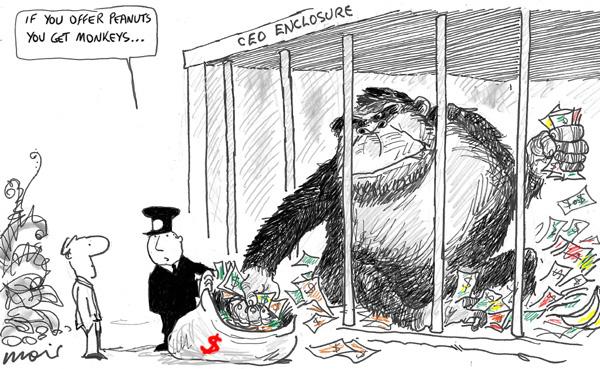Search
Democracy Links
Member's Off-site Blogs
governance .....

from Crikey …..
A bit rich: Australia's CEO payout shameAdam Schwab writes:
Even in the most significant sharemarket correction since the Great Depression it appears that directors have been reluctant to show any restraint in the payment of remuneration and termination payments to executives.Telstra last week announced that it sought to "correct highly inaccurate statements in the media around the CEO's exit payment. Mr Trujillo is eligible for an exit payment of $3 million when he leaves the company on 30 June, 2009".
It is ironic that Telstra sought to correct "highly inaccurate statements" with a highly inaccurate statement. Trujillo told media last week that he was retiring in order to spend more time with family -- it was clear that Trujillo was not terminated by Telstra. In defending Trujillo’s $3 million golden handshake, Telstra claimed that "Sol's entitlements, including the calculation of the payment to be made to him when his contract terminates and his annual salary and related performance incentives, are stated in his contract which has been lodged with the ASX and is publicly available."However, Trujillo's employment contract clearly provides that he is only entitled to a "termination payment" if he is terminated by Telstra or chooses to terminate his own employment with "good reason" (good reason is defined to include a change in responsibilities or a breach by the company). Trujillo did not satisfy the definition of good reason and therefore, was not contractually entitled to termination payment. It appears that Telstra invented the term "exit payment" last week to create some sort of fictional entitlement to ensure Trujillo didn’t leave empty handed.
Telstra, however, is hardly alone in spending shareholders' funds on "termination payments" to departing CEOs which are not legally owed. While current Pacific Brands CEO Sue Morphet has been criticised for receiving a $1.2 million pay rise while planning to sack 1850 workers, her predecessor, Paul Moore, received a $3.48 million "termination payment" after he resigned 14 months ago. Pacific Brands' share price has slumped by more than 95% since his departure.In fact, the list of largest termination payments since 2004 (compiled by RiskMetrics) shows a correlation between shimmering golden handshakes and low shareholder returns:
Executive
Company
Termination Payment
Share price change since departure
John Ellice Flint
Santos
$ 16,812,187.00
6%
John Alexander
Consolidated Media
$ 15,000,000.00
-51%
Owen Hegarty
Oz Minerals
$ 8,350,000.00
-76%
Tony D'Aloisio
ASX
$ 7,779,159.00
-22%
Mike Tilley
Challenger
$ 6,000,000.00
-54%
Michael Chaney
Wesfarmers
$ 5,300,000.00
-56%
Paul Anthony
AGL
$ 5,118,840.00
-10%
Malcolm Broomhead
Orica
$ 4,788,100.00
-7%
Anthony Palmer
Newcrest
$ 4,400,000.00
34%
Kim Edwards
Transurban
$ 4,060,201.00
-32%
Fred Hilmer
Fairfax
$ 4,000,000.00
-78%
Duncan Fischer
Tattersalls
$ 3,567,556.00
-15%
Matthew Slatter
Tabcorp
$ 3,209,589.00
-62%
Andrew Scott
Centro
$ 3,000,000.00
-88%
Roger Corbett
Woolworths
$ 3,000,000.00
45%
David Murray
CBA
$ 2,400,000.00
-22%
Source: RiskMetrics
While Woolworths' share price has increased 45% since Roger Corbett's retirement, and Santos and Newcrest have benefited from higher gold and coal-seam methane valuations, the majority of the executives listed left their companies in a perilous state while departing wealthy men (and they're all men).Tony D'Aloisio, the current head of ASIC (the organisation charged with defending investor rights), received a termination payment of $7.8 million after he stepped aside to allow Sydney Futures Exchange boss, Robert Elstone, to take over the merged entity. Since his resignation, the ASX share price has dropped 22% and its monopoly status is under threat due to poor performance in relation to insider trading and continuous disclosure.
Despite new CEO Chris Lynch repudiating his business plan and profligacy, former Transurban CEO, Kim Edwards, received a retirement payment of more than $4 million. Similarly, former consultant and Fairfax chief Fred Hilmer was gifted $4 million by the Fairfax board upon his departure. Since then, Fairfax's share price has slumped 78%. Oz Minerals decided to pay Owen Hegarty $8.35 million last year for his contribution to shareholder growth -- since then, the Oz Minerals share price has slumped 78% and may have fallen to zero but for a takeover bid from Minmetals.Investors must place a large degree of trust in their directors and executives. However, when those company directors authorise significant, unnecessary and un-contracted retirement benefits to their outgoing CEO that trust is irrevocably broken. While regulation of wages and benefits is not necessary beneficial, company directors have shown through excessive remuneration and unnecessary termination payments that they simply cannot be trusted as safe-keepers of shareholder funds.
- By John Richardson at 5 Mar 2009 - 6:01am
- John Richardson's blog
- Login or register to post comments
Recent comments
7 hours 33 min ago
13 hours 10 min ago
16 hours 30 min ago
17 hours 54 min ago
18 hours 7 min ago
19 hours 40 min ago
19 hours 48 min ago
20 hours 35 min ago
1 day 10 hours ago
1 day 12 hours ago